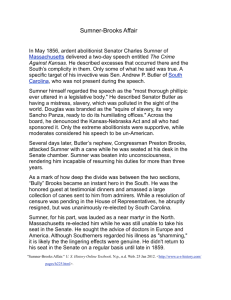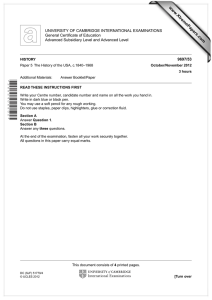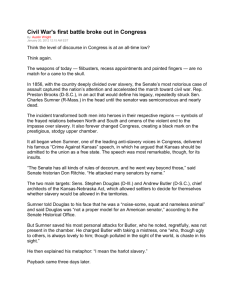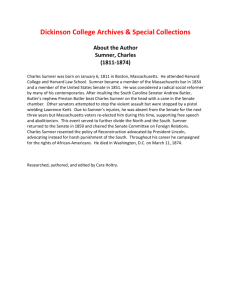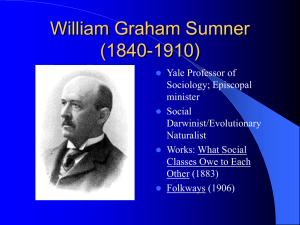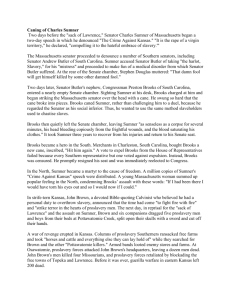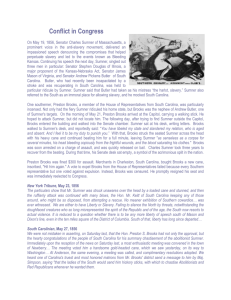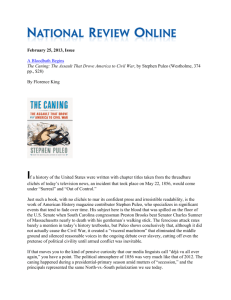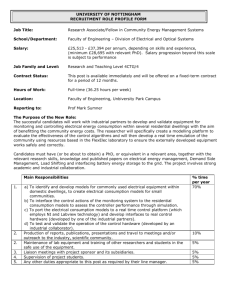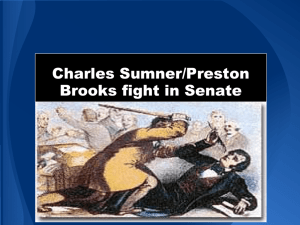www.theallpapers.com
advertisement
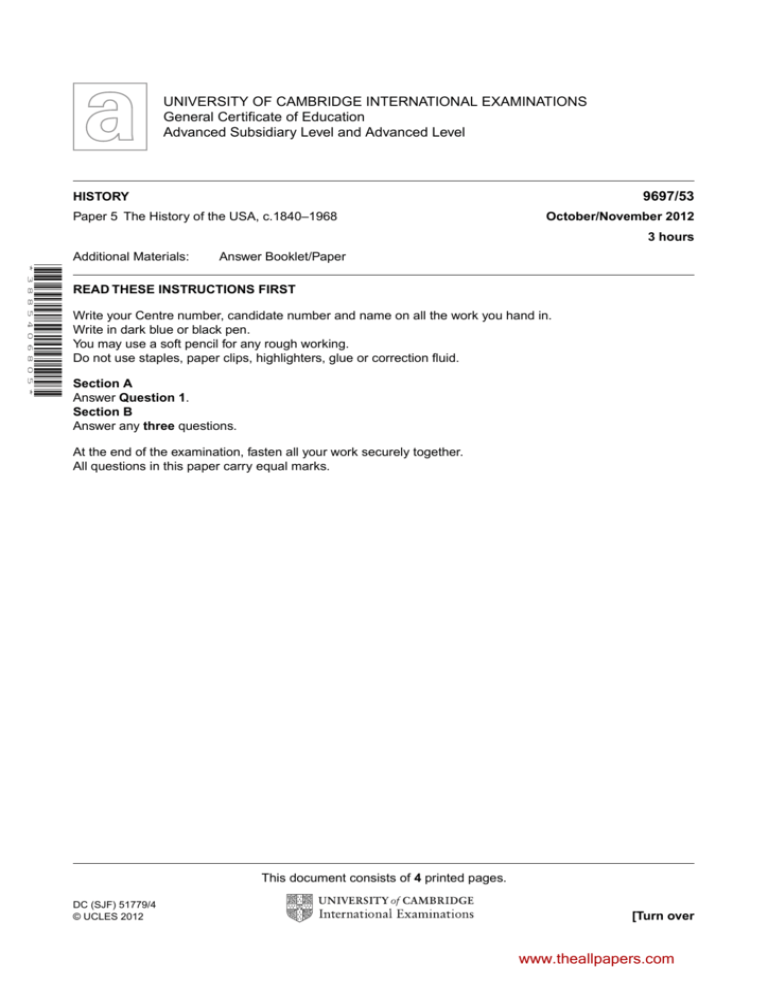
UNIVERSITY OF CAMBRIDGE INTERNATIONAL EXAMINATIONS General Certificate of Education Advanced Subsidiary Level and Advanced Level 9697/53 HISTORY Paper 5 The History of the USA, c.1840–1968 October/November 2012 3 hours Additional Materials: Answer Booklet/Paper * 3 8 8 5 4 0 6 8 0 5 * READ THESE INSTRUCTIONS FIRST Write your Centre number, candidate number and name on all the work you hand in. Write in dark blue or black pen. You may use a soft pencil for any rough working. Do not use staples, paper clips, highlighters, glue or correction fluid. Section A Answer Question 1. Section B Answer any three questions. At the end of the examination, fasten all your work securely together. All questions in this paper carry equal marks. This document consists of 4 printed pages. DC (SJF) 51779/4 © UCLES 2012 [Turn over www.theallpapers.com 2 Section A: The Road to Secession and Civil War, 1846–1861 You must answer Question 1. THE ATTACK ON SENATOR CHARLES SUMNER IN THE SENATE CHAMBER 1 Read the Sources and then answer the question. When answering Question 1, candidates are advised to pay particular attention to the interpretation and evaluation of the Sources both individually and as a group. Source A Fellow Americans, the treatment of Kansas is sacrilege, robbery and tyrannical usurpation. It is the rape of a virgin territory and may clearly be traced to a depraved longing for a new slave State, in the hope of adding to the power of slavery in the national government. If the whole history of South Carolina with its shameful, imbecile attachment to slavery were blotted out, civilization would lose less than it has already gained by the wonderful example of the free state men of Kansas. Senator Butler is a spokesman for the criminal, grasping, slave power arrogantly corrupting public life. Butler has chosen his mistress, to whom he has made his vows, and who though ugly to others is always lovely to him: I mean the harlot ‘slavery’. For her his tongue is always profuse with words of praise. In a recent speech in Kansas the white-haired South Carolina Senator overflowed with rage, and with incoherent phrases discharged the loose expectorations of his speech upon the people of that long-suffering Territory. The Senator touched nothing he did not disfigure with error. He cannot open his mouth but out there flies a blunder and he constantly engages in deviations from the truth. Senator Charles Sumner’s speech to the US Senate, 19 May 1856. Source B After the Senate adjourned, Congressman Brooks approached Senator Sumner who was sitting at his desk and said to him, ‘I have read your speech, you have libelled my state and slandered my relative, Senator Butler, and I have come to punish you for it.’ Brooks then struck the Senator with his cane some dozen times over his head. Senator Crittenden and others separated them, except for Mr Keith of South Carolina who did not interfere except to keep others off. Senator Toombs was heard to declare it was the proper place to have chastised Mr Sumner. This affair is regretted by all. The cane used was hollow and broke into pieces. As Mr Sumner fell between two desks he lay bleeding and cried out ‘I am almost dead, almost dead.’ New York Herald, 23 May 1856. Source C Sumner was a foul-mouthed fool; when caned for cowardly vituperation he falls to the floor, an inanimate lump of cowardice. The only regret we feel is that Mr Brooks did not employ a horsewhip instead of a cane, because what can be done with men like Sumner but to cowhide bad manners out of him and good manners into him? The vulgar abolitionists are getting above themselves; they have gone so far as to be impudent to a gentleman. Richmond Enquirer, 25 May 1856. © UCLES 2012 9697/53/O/N/12 www.theallpapers.com 3 Source D There is but one possible way in which slavery can be abolished and that is by leaving a State, according to the principle of the Kansas-Nebraska bill, perfectly free to form and regulate its institutions in its own way. This was the principle on which the Republic was founded and it is under the operation of that principle that we have been able to preserve the Union thus far. Under its operation, slavery disappeared from New Hampshire, from Rhode Island, from Connecticut, from New York, from New Jersey, from Pennsylvania, from six of the twelve original slaveholding States; and this gradual system of emancipation went on quietly, peacefully and steadily, so long as we in the free States minded our own business and left our neighbors alone. Stephen Douglas, election speech, Bloomington, Illinois, 16 July 1858. Source E Republican Senator Charles Sumner of Massachusetts delivered an angry speech entitled ‘The Crime Against Kansas’ in which he castigated most of the Senate for complicity in slavery. Sumner singled out Senator Andrew Butler of South Carolina for his choice of ‘the harlot slavery’ as his mistress and for the ‘loose expectorations of his speech’ (a nasty reference to the ageing Butler’s tendency to drool). Sumner’s oration stunned most Senators. Douglas wondered aloud whether Sumner’s real aim was ‘to provoke some of us to kick him like a dog in the street’. Two days later a relative of Butler, Congressman Preston Brooks, strode into the Senate chamber, and started to beat Sumner repeatedly with a cane. Sumner experienced severe shock and did not return to the Senate for three years. Brooks became an instant hero in the South and fragments of his weapon were treated as ‘sacred relics’. Several new canes were presented to him; one from the city of Charleston bore the inscription ‘hit him again’. On the other hand Brooks’ actions shocked Northern opinion and confirmed their image of white Southerners as people who prided themselves on their manners but who, when provoked, behaved like street toughs. A modern American historian’s view of the ‘Sumner Incident’. Now answer the following question. ‘Senator Sumner’s 1856 speech revealed an unbridgeable division between North and South.’ Using Sources A–E, discuss how far the evidence supports this assertion. © UCLES 2012 9697/53/O/N/12 [Turn over www.theallpapers.com 4 Section B You must answer three questions from this section. 2 Account for the success of the Mormons in establishing their new homeland in Salt Lake Valley in the face of so many obstacles. 3 ‘The Civil War was won by the Union in spite of Lincoln, not because of him.’ How accurate is this assessment? 4 ‘A reluctant reform, aimed at quieting socialism rather than making fundamental change.’ Is this a fair comment on Progressivism? 5 Critically examine the view that divisions within the civil rights movement were the major factor in delaying full implementation of African American civil rights in the period from 1900 to 1968. 6 To what extent was President Hoover to blame for the critical state of the US economy when he left office in March 1933? 7 In your view, which President was the most successful in implementing US foreign policy from 1898 to 1945? 8 How far did America become a more tolerant nation during the period from 1945 to 1968? Copyright Acknowledgements: Source E © P Boyer et al; The Enduring Vision: A History of the American People; Houghton Mifflin; 2008. Permission to reproduce items where third-party owned material protected by copyright is included has been sought and cleared where possible. Every reasonable effort has been made by the publisher (UCLES) to trace copyright holders, but if any items requiring clearance have unwittingly been included, the publisher will be pleased to make amends at the earliest possible opportunity. University of Cambridge International Examinations is part of the Cambridge Assessment Group. Cambridge Assessment is the brand name of University of Cambridge Local Examinations Syndicate (UCLES), which is itself a department of the University of Cambridge. © UCLES 2012 9697/53/O/N/12 www.theallpapers.com
